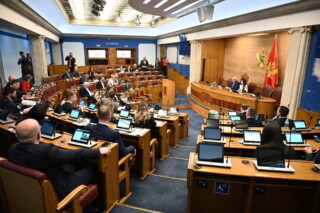Russian intelligence operative Eduard Shishmakov attended the Russian Security Council’s meetings, according to the British Bellingcat research network and the Russian Insider magazine. Shishmakov is a member of the Russian Central Intelligence Directorate (GRU) and one of the organisers of the criminal group planning a terrorist attack in Montenegro, on 16 October last year.
The research, whose author is an expert on relations between Russia and South-Eastern Europe, Hristo Grozev, shows that the second suspect for the attempted coup, Russian national Vladimir Popov, was in charge for the delivery of encrypted phones, which were allegedly purchased in Bulgaria.
Putin’s man
Although Moscow has on several occasions denied any involvement in the developments in Montenegro, Shishmakov’s presence at the Security Council’s meetings clearly indicates the opposite, particularly due to the fact that the Security Council is chaired by Nikola Patrushev, head of Russian intelligence service, who came to Belgrade last year, only ten days after the attempted coup in Montenegro.
Analysts said that the reason for Patrushev’s visit to Serbia was not only the signing the memorandum of understanding, but rather considering the situation in Montenegro after the coup plan failed. Serbian media published information that unnamed “Russian agents who had been in Serbia” returned to Moscow with Patrushev”.
Patrushev is said to be Putin’s confidential man and “alpha and omega” of Russian security services.
In addition to Shishmakov, the meeting held in 2014 was also attended by the deputy secretary of the Russian Security Council Yevgeny Lukianov (Partrushev’s deputy), as well as the director for defence of the Russian Institute for Strategic Studies Grigory Tishchenko. Grozev points out that Shishmakov’s name was omitted in the Russian version of the report on the meeting of the Security Council.
The research calls in mind that, since January 2014, Shishmakov was maritime military attaché at the Russian embassy in Warsaw. It adds that “there is no doubt that since his was expelled from Poland in October 2014, Shishmakov has been in active GRU service”.
GRU mission
The research says that Shishmakov’s roommate was also identified. He is allegedly the “first deputy chief of GRU and the commander of the 62986 military intelligence unit, which has been recognized by Ukraine as a key component of GRU in the Russian intervention in eastern Ukraine”. Eduard Shishmakov also has a specified address in Sankt Petersburg. This address, according to sources, is the address of an apartment owned by GRU, the research says.

Shishmakov travelled to Serbia with Russian passport under the name of Eduard Shirokov.
The passport with the name Shirokov was issued in August 2016. Shishmakov’s authentic passport was issued in 2012 states Grozev.
The author points out that “issuing of a passport under a false name in August 2016, ie two months before the trip to the Balkans on the eve of parliamentary elections in Montenegro, further confirms the hypothesis that Shishmakov was in a GRU mission aimed at meddling in the elections in Montenegro”.
Encrypted Phones
When it comes to the role of another suspect, Vladimir Popov, according to data from Moldova, a person with the same name and date of birth has visited Moldova in May/June 2014. Popov is said to have met with Gagauzia separatists and opponents of the European Union.
A source at the Bulgarian border control confirmed that a person of the same name and nationality, using the Schengen visa, was registered that travelled from Bulgaria on 10 October 2016, the research says.
The research says that Popov’s trip to Bulgaria was connected with the delivery of encrypted phones, which, according to the media, were purchased through the Bulgarian website.
Bellingcat and Insider state that their research does not aim to provide a final assessment of all the facts claimed by Montenegrin authorities, but it is focused on assessment of credibility of the Russian intervention in the internal political affairs of Montenegro, in the context of a broader review of Russian activities in southern Europe.
Malofeev was indirectly responsible for the coup in Montenegro
Hacked e-mails show that a certain Aleksandar Usovsky was an associate of Russian tycoon Konstantin Malofeev, who gave orders for operations in several Eastern European countries. These conversations, as alleged, provide indirect evidence that Malofeev had tasks in the coup attempt in Montenegro. Usovsky is apparently convinced that Malofeev was “behind unnecessary fiasco in Montenegro”.
Usovsky maintained contacts with Malofeev over Elena Sharoykina, director of Tsargrad TV station owned by Malofeev, known for frequent attacks on Montenegro.
In an Usovsky’s letter to her sent on 28 November 2016, he openly proposed a new initiative that will improve the situation after the failure in Montenegro.
“The file I attached contains the things I can certainly do in Poland legally and relatively quickly, without any conspiracy, exclusively through legal means. However, the effect of this operation would be 100 times more significant than the unsuccessful fuss in Montenegro. It would be just seven weeks from the moment of obtaining money to information boom in the media. After this, no one will remember the failure that K. V. (Konstantin Valerevic Malofeev) had in Montenegrin adventure. Everyone will see him as a peacemaker in Poland and as the man who made the first step on the road to full abolishment of Russophobia in Poland. This is not a joke. I can do all that in the mentioned period and for the said sum of money. Sincerely, Aleksandar Usovsky,” the letter reads in Russian.




